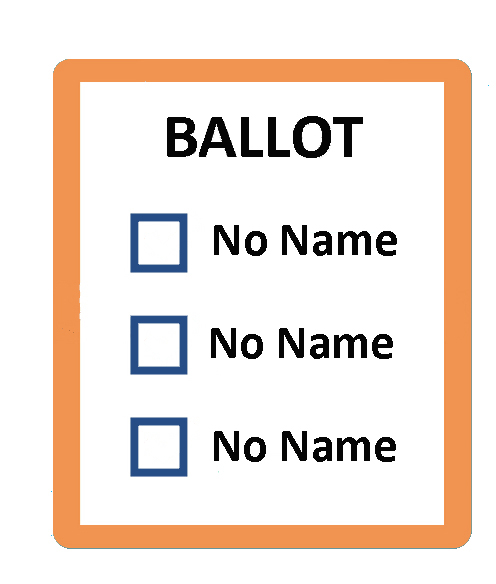|
CANDIDATE WITHDREW
FROM THE ELECTION
QUESTION: If a candidate is on the ballot and then withdraws during the election, can he decide to return once he finds out he received enough votes to win? –Jan G. If a candidate is on the ballot and then withdraws during the election, can he decide to return once he finds out he received enough votes to win? –Jan G.
ANSWER: No, he can't. There are two reasons why the x-candidate cannot claim the seat. First, once he withdrew from the race, members may have shifted their votes, especially when there is cumulative voting. It can skew election results impacting other candidates and lead to an election challenge.
Second, once the votes were tallied, the Inspector of Elections would have invalidated the x-candidate's votes and announced the election of other candidates to the open seats. Your x-candidate cannot change his mind after the election is over and decide he wants back in. He will need to wait for next year's election.
NO BOARD
CANDIDATES
QUESTION: Since boards are now allowed to declare elections by acclamation (if the number of nominations received is equal to or less then the number of vacancies open), what if there are no candidates? I assume the board would need to appoint a director. –Steve C. Since boards are now allowed to declare elections by acclamation (if the number of nominations received is equal to or less then the number of vacancies open), what if there are no candidates? I assume the board would need to appoint a director. –Steve C.
ANSWER: To declare election winners you need candidates. If no one is willing to step up, there is no one to elect. In that case, the current directors remain in office until the next election. In some associations, this might go on for years where members are content to let the existing directors continue managing the association. As provided for in Corporations Code § 7220(b):
Except as otherwise provided in the articles or bylaws, each director, including a director elected to fill a vacancy, shall hold office until the expiration of the term for which elected and until a successor has been elected...
If there are no candidates in the election causing existing directors to carry over, and a director decides to vacate his/her seat, the remaining directors will need to seek out and convince another member to fill the seat. If there are staggered terms, boards will sometimes lose track of which seats are up for election. When that occurs, the board will need to decide among themselves who will stand for election each year.
Even though apathy is a problem for many associations, it is sometimes the result of good management by directors. Homeowners are content to let existing directors continue in office if they believe they are doing a good job. When that occurs, existing directors struggle to convince others to give time to serving on the board.
SMALL BUILDING
BALCONY INSPECTIONS
QUESTION:  SB 326 states that "This section shall only apply to buildings containing three or more multifamily dwelling units." Our association has twenty buildings, with only two condos per building. Does that mean we don't need to inspect our balconies? -Bill SB 326 states that "This section shall only apply to buildings containing three or more multifamily dwelling units." Our association has twenty buildings, with only two condos per building. Does that mean we don't need to inspect our balconies? -Bill
ANSWER: Even though you have 40 balconies (20 buildings times 2), a strict reading of the statute exempts your association from the requirements of invasive inspections. (Civ. Code § 5551(l).) Even though you are exempted, you still need to make visual inspections every three years for your reserve study requirements.
The problem with external visual inspections is that they are external. They can't detect dry rot and termite damage to a balcony's structural elements. If any of your balconies collapse causing injuries or deaths, it is almost guaranteed your association will be sued.
Plaintiffs will seek a jury trial and allege the board was negligent in their maintenance obligations and their failure to properly inspect balconies when every other association in the state was performing invasive inspections. A jury would likely agree with plaintiff's counsel and award substantial damages to the victims. The litigation will negatively impact property values, the buying and selling of units, and insurance premiums. Moreover, the failure of one balcony means all balconies will need to be inspected either during or after the litigation.
RECOMMENDATION: It is less expensive to conduct a § 5551 inspection of your elevated structures than to defend against a wrongful death action. If the inspection finds problems, you can address them and avoid potential harm to residents. If the inspection determines your balconies are in good shape, it provides a layer of protection for the association (and directors) in the event one were to collapse. In addition to inspections, you should institute a regular plan of preventive maintenance and balcony repairs.
ARCHITECTURAL
COMMITTEE MEMBERS
QUESTION: Can we have a paid architect replace one of the members of our architectural committee? –Bita
ANSWER: It depends on your CC&Rs. If they require that members of the architectural committee be members of the association, a non-member architect cannot serve on the committee. The architect can, however, review plans, attend meetings, and make recommendations to your architectural committee.
If your governing documents do not require committee members be members of the association, your paid architect can serve as a voting member of the committee.
RECOMMENDATION: If associations can afford to have a licensed architect assist their architectural committee, they should do so. It can save them a lot of problems with owner submissions and potential legal expenses. It has been my experience that an owner submitting plans for architectural review will more readily accept feedback from an independent third party architect working for the association than from their neighbor serving on the committee.
KUDOS: Thank you! The board met last Thursday, and being new to the board, I wasn’t sure I should speak up. The information on your website gave me the confidence I needed to broach a subject. Should we feel we need better counsel than we have now, I’ll definitely suggest your firm! Thank you again. -Laura
Love your newsletters! As a former board member and longtime homeowner, I find the information useful, easy to understand, and often times very timely for issues in our HOA. –Debbie D.

|